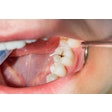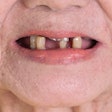Prolonged fasting in patients with metabolic syndrome, a cluster of conditions that raise the risk of cardiovascular disease, diabetes, and stroke, may be linked to a reduction in gum inflammation. The study was published May 12 in the Journal of Clinical Periodontology.
However, larger controlled trials should be done in the future to confirm these findings, the authors wrote.
“Our findings indicate that modest clinical improvements in gingival inflammatory parameters, that is, BOP and GCF volume, can occur in patients with MetS (metabolic syndrome) undergoing a dietary intervention without adjunctive periodontal therapy,” wrote the authors, led by Dr. Daniel Hagenfeld of the University Hospital of Münster in Germany.
Metabolic syndrome is when a person has three or more conditions like high blood pressure, high blood sugar, too much fat around the waist, and high cholesterol, which can increase the risk of diabetes, stroke, and cardiovascular problems.
Fasting has been shown to have anti-inflammatory and metabolic benefits, including decreasing glucose levels and increasing stress resistance, which can affect the periodontium.
To investigate how prolonged fasting can affect the oral microbiome in patients with metabolic syndrome, 42 patients with this condition were evaluated. Periodontal parameters like bleeding on probing (BOP), the plaque index (PI), and gingival crevicular fluid (GCF) were measured at baseline, after five to 10 days of fasting, and at a four- to five-month follow-up, according to the study.
After fasting, there were dramatic decreases in BOP (36.4% ± 18.2% to 30.4% ± 15.6% [p = 0.01]), the plaque index (66.9% ± 19.5% to 58.8% ± 23.4% [p < 0.01]), and GCF (83.6 ± 27.8 PU to 67.9 ± 30.3 PU [p < 0.01]), the authors wrote.
Though the study did not have limitations, the authors noted that it was done as an exploratory analysis and not a clinical trial. Therefore, these findings should be interpreted as hypothesis-generating observations that need further investigation, they wrote.
“These data collectively suggest that targeted nutritional interventions may have a supportive role in modulating periodontal parameters, particularly in metabolically compromised populations,” Hagenfeld and colleagues wrote.




















